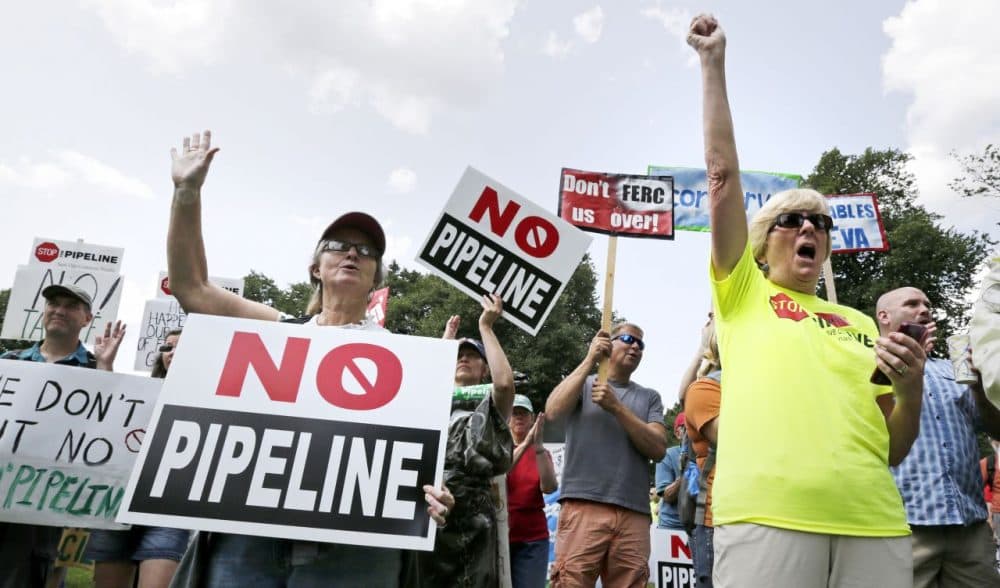Advertisement
Kinder Morgan Suspends Work On Controversial Pipeline Project

Citing inadequate commitments from prospective customers, Kinder Morgan on Wednesday suspended further work and spending on its Northeast Energy Direct natural gas pipeline project, which held the possibility of helping Massachusetts and the New England to meet its energy and electricity cost goals.
Less than a year ago, in July 2015, the company's board authorized Tennessee Gas Pipeline (TGP) Company to move forward with a $3.3 billion investment in pipeline capacity from Wright, New York, to Dracut, Massachusetts. On Wednesday, Kinder Morgan said that approval was based on contractual commitments at the time and expected commitments from additional gas distribution companies, electric distribution companies and other "market participants" in New England.
"Unfortunately, despite working for more than two years and expending substantial shareholder resources, TGP did not receive the additional commitments it expected," Kinder Morgan said in a statement on Wednesday. "As a result, there are currently neither sufficient volumes, nor a reasonable expectation of securing them, to proceed with the project as it is currently configured."
Environmentalists, rival energy sectors and some public officials have questioned both the costs of the pipeline project and the wisdom of increasing the region's already heavy reliance on natural gas.
Last year, state Attorney General Maura Healey's office released a report finding that New England doesn't need more natural gas pipelines.
Kinder Morgan had hoped the project would address natural gas transportation problems affecting the Northeast and alleviate "uniquely high" gas and electricity costs.
In its statement, Kinder Morgan attributed the lack of contracted capacity to the lack of regulatory procedures in the New England states to facilitate binding commitments and the "open-ended" nature for establishing those procedures in each state.
"In addition, innovations in production have resulted in a low-price environment that, while good for consumers, has made it difficult for producers to make new long term commitments. Further, current market conditions and counter-party financial instability have called into question TGP's ability to secure incremental supply for the project. Given these market conditions, continuing to develop the project is not an acceptable use of shareholder funds," Kinder Morgan said.
The statement continued: "[TGP plans to] continue to work with customers to explore alternative solutions to address their needs, particularly local distribution companies that are unable to fully serve consumers and businesses in their areas because of the lack of access to abundant, low-cost domestic natural gas."
In a statement released by the governor's office, Peter Lorenz, communications director for the state Department of Energy and Environmental Affairs, said: "The Baker-Polito Administration believes [the] announcement highlights the pressing need to secure cost-effective hydropower and other renewable energy resources to meet the growing demand for affordable energy in Massachusetts and New England.”
Energy industry stakeholders — from natural gas to offshore wind and solar and hydro producers — are jockeying for a piece of the region's supply mix as lawmakers contemplate major energy policy legislation and the looming 2019 shutdown of Pilgrim Nuclear Power Station in Plymouth, a major source of carbon-free power.
"Kinder Morgan is stopping the pipeline simply because it is both expensive to ratepayers and simply not needed," Environmental League of Massachusetts President George Bachrach said. "Massachusetts has the capacity to develop its own energy in solar, wind and hydro and create new industries and jobs here, rather than importing energy and exporting our dollars and jobs."
In a statement Thursday, U.S. Sen. Elizabeth Warren said the Kinder Morgan project "simply isn't necessary to meet our energy needs."
With additional reporting by State House News Service's Matt Murphy and the WBUR Newsroom
This article was originally published on April 20, 2016.